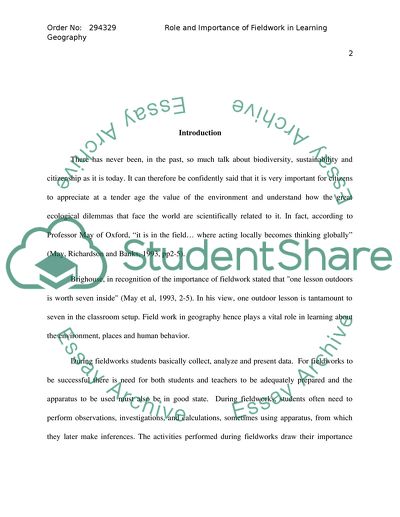Cite this document
(“Role and Importance of Fieldwork in Learning Geography Research Paper”, n.d.)
Role and Importance of Fieldwork in Learning Geography Research Paper. Retrieved from https://studentshare.org/education/1723438-brighouse-noted-one-lesson-outdoors-is-worth-seven-inside-may-et-al-1993-pg-2-despite-such-support-fieldwork-remains-relatively-rare-for-primary-children-in-geography-discuss-with-reference-to-literature-and-your-own-experience
Role and Importance of Fieldwork in Learning Geography Research Paper. Retrieved from https://studentshare.org/education/1723438-brighouse-noted-one-lesson-outdoors-is-worth-seven-inside-may-et-al-1993-pg-2-despite-such-support-fieldwork-remains-relatively-rare-for-primary-children-in-geography-discuss-with-reference-to-literature-and-your-own-experience
(Role and Importance of Fieldwork in Learning Geography Research Paper)
Role and Importance of Fieldwork in Learning Geography Research Paper. https://studentshare.org/education/1723438-brighouse-noted-one-lesson-outdoors-is-worth-seven-inside-may-et-al-1993-pg-2-despite-such-support-fieldwork-remains-relatively-rare-for-primary-children-in-geography-discuss-with-reference-to-literature-and-your-own-experience.
Role and Importance of Fieldwork in Learning Geography Research Paper. https://studentshare.org/education/1723438-brighouse-noted-one-lesson-outdoors-is-worth-seven-inside-may-et-al-1993-pg-2-despite-such-support-fieldwork-remains-relatively-rare-for-primary-children-in-geography-discuss-with-reference-to-literature-and-your-own-experience.
“Role and Importance of Fieldwork in Learning Geography Research Paper”, n.d. https://studentshare.org/education/1723438-brighouse-noted-one-lesson-outdoors-is-worth-seven-inside-may-et-al-1993-pg-2-despite-such-support-fieldwork-remains-relatively-rare-for-primary-children-in-geography-discuss-with-reference-to-literature-and-your-own-experience.


